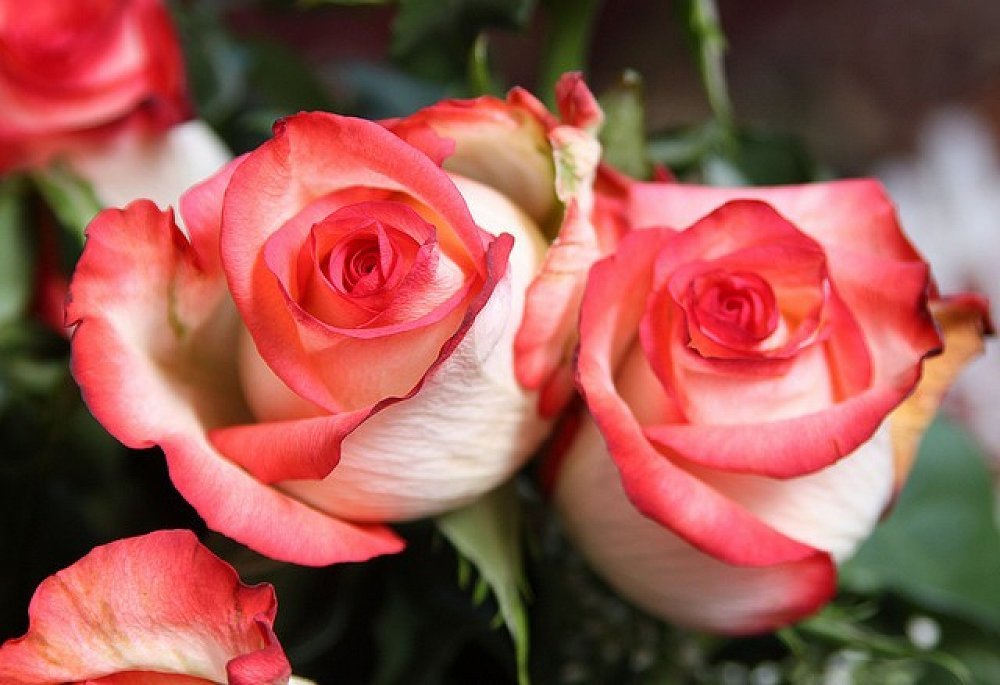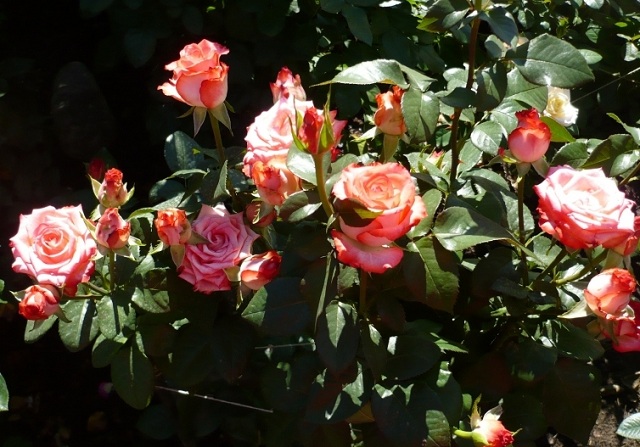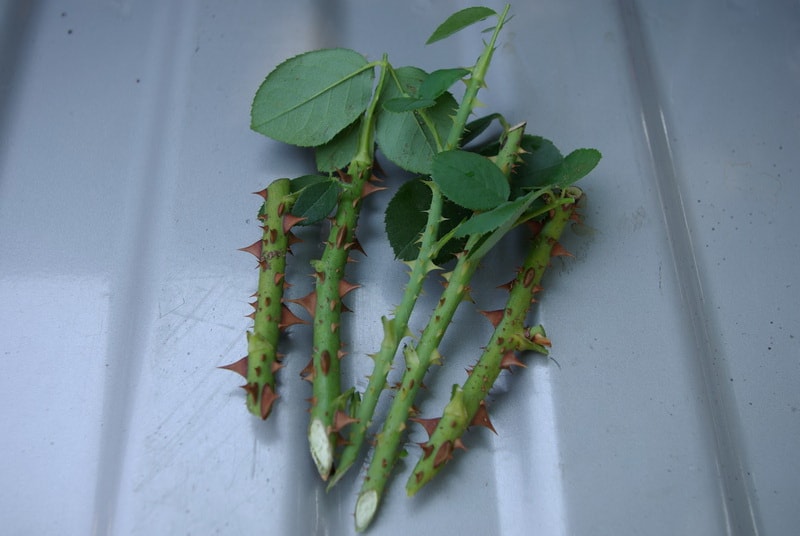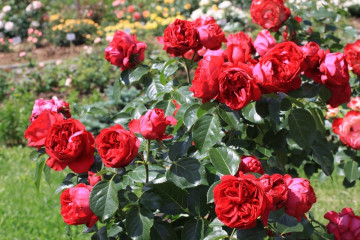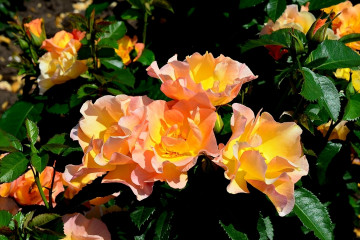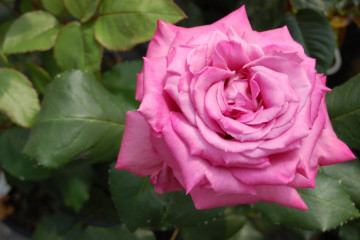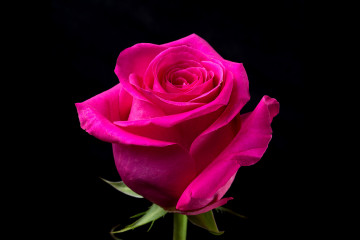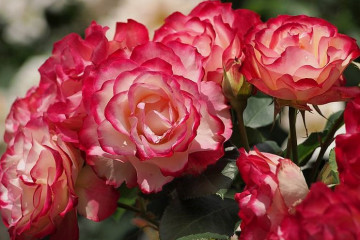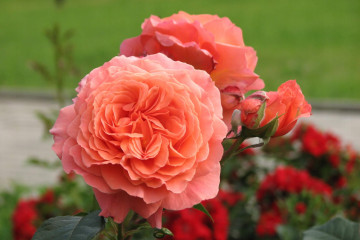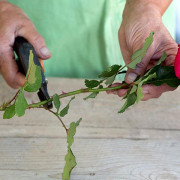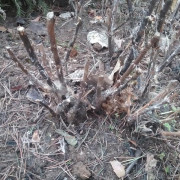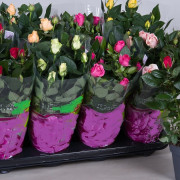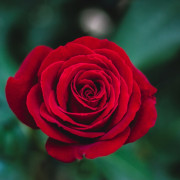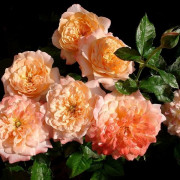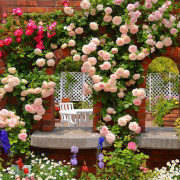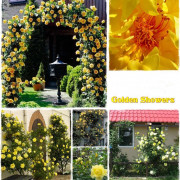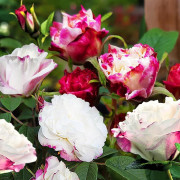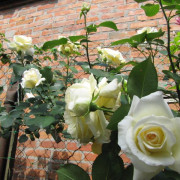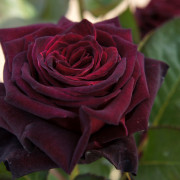Rose Blush (Blush) - description and characteristics of the variety
Content:
The Blush variety was born thanks to Canadian breeders. The peculiarities of the hybrid make it possible to grow it anywhere on the CIS map, because it easily adapts to heat and endures the most persistent frosts.
Rose Blush (Blush): what kind of variety, history of creation
Rose Morden Blush belongs to hybrid tea varieties. Correctly shaped bicolor crimson flowers delight their owners for up to 14 days and bloom for several days throughout the season.
Brief description and characteristics
The variety belongs to re-flowering, with each flowering abundantly covers the shrub with racemose inflorescences. The flowers are densely double, soft pink inside, bright crimson around the edges.
In cold climates, the height of the shrub reaches 1 m, in temperate and hot climates - 2 m. The leaves are green, matte.
Advantages and disadvantages of the variety
Features of the Canadian variety:
- frost resistance up to -35 ° С;
- quick recovery of shoots after freezing;
- drought resistance;
- long and abundant flowering;
- large inflorescences;
- resistance to some common diseases.
Among the disadvantages are the following:
- slow development after planting;
- lack of flowering in the first 2-3 years after planting;
- weak root growth.
Use in landscape design
Rose Blush is used in group plantings on an ordinary green lawn, planted in mixborders. Looks fully and in single landings. Looks harmoniously with white and yellow bushes.
Growing a flower
A healthy seedling, the correct planting site and soil composition are the main criteria for rapid growth and lush flowering of the rose.
Planting a rose
To grow a rose Blazh on the site, you need to prepare seedlings from cuttings or purchase ready-made ones.
The purchase of seedlings is carried out at the end of March and is stored in a cool room until planting in the ground. Immediately before planting, the rose is placed in a vessel with water for several hours.
What time is the boarding
Blanche hybrid tea rose is planted on the site in the spring, after warm weather sets in, or in the fall before the arrival of frost.
Location selection
Modern Blush is planted in sunny areas. The shrubs should not be exposed to direct sunlight, they are allowed only in the morning or evening. The rose calmly tolerates partial shade.
Air must circulate on the site, but drafts and cold air currents are not allowed. Better to choose an elevated location.
How to prepare the soil and flower for planting
Ideal soil properties for growing Blush roses:
- loose;
- loamy or slightly loamy;
- slightly acidic (pH 5-6);
- rich in humus.
Black soil or any other fertile soil will do. Sandy soil, which is poor in nutrients and is unable to retain moisture, will badly affect the appearance of the shrub. In this case, the sandy soil must be diluted with turf soil, compost, clay or peat.
Planting procedure step by step
How to plant a rose Blazh on a site:
- Dig planting holes at a distance of 0.5 m from each other with a depth of 50 cm.
- Soak the roots in a mixture of manure, clay and water in a 1: 2: 1 ratio.
- Spread the roots.
- Place the seedling in the hole.
- Cover with earth.
- Compact the soil.
- Make a roller of earth around the stem so that water is kept near the shrub during watering.
Plant care
The formation of buds occurs at an air temperature of 14-20 ° C. This temperature range is especially important in the first years of the shrub's life. Therefore, in extreme heat and frost, the plant is covered with lutrasil and spud 15 cm to protect the buds.
Watering rules and humidity
In warm weather, one adult shrub requires 1 bucket of water 2-3 times a week, and in dry weather, 2 buckets.
Top dressing and soil quality
It is best to stick to the following rose fertilization scheme:
- in the spring, during the period of active growth, nitrogen fertilizer is applied for the first time, potash fertilizer for the second time;
- during the period of bud formation and after the end of flowering, a universal organic fertilizer is applied, alternating with mineral fertilizer;
- in the fall, before the end of the flowering period, phosphorus-potassium dressings are applied.
Pruning and replanting
Cropping serves two purposes. The first is the forming bush. You can skip it if you want the plant to be tall and spreading. The second cut is sanitary. Before winter, all weak and dry shoots are cut off. The event is also held in spring, removing all branches that have not been able to successfully overwinter. Places of cuts are treated with ash.
Features of wintering a flower
After sanitary pruning at the end of autumn, the flexible stems are tilted to the ground and covered with dry foliage. The crown is covered with spruce branches and insulating non-woven material.
Blooming rose
A feature of the Moden Blach variety is that only one flower appears on one branch. A delicate aroma emanates from the bud.
A period of activity and rest
The bloom of the Blush rose is plentiful and lasts from May to the end of autumn. Flowering is continuous, some buds on the bush are replaced by others.
Care during and after flowering
Before flowering, the plant is fertilized with nitrogen fertilizer, after - with phosphorus-potassium. It is better to remove buds that have already bloomed yourself so that they do not consume nutrients.
What to do if it does not bloom
If the rose has not bloomed, this indicates the creation of improper growing conditions.
Perhaps the plant does not have enough moisture or feeding.
Flower propagation
Reproduction is carried out by cuttings, branches are cut from semi-lignified shoots.
When is it produced
Cuttings are harvested when buds appear or immediately after flowering. The material is taken from the central part of the shoot, cut into 5-8 cm long. The lower foliage is removed completely, the upper one is cut in half, there should be three leaves.
The lower cut is made under the kidney at an angle of 45 °, the upper one exactly 1 cm above the kidney.
Detailed description
On the day before planting, the cuttings are soaked in a root dew stimulator for 20 hours. After that, the planting material is washed with water and planted in the ground or pots with sod-humus soil and a layer of sand with peat 3-4 cm.
The cuttings are buried in the ground by 2 cm, planted at an angle. A greenhouse is made from a can or oilcloth.
Diseases, pests and ways to control them
This variety is affected by fungal diseases, shoots can be damaged by leaf rollers, aphids, spider mites, caterpillars. Affected shoots are removed, foliage is treated with insecticides or fungicides.
Blanche is a rose that will not leave indifferent any grower. It is one of the best varieties for home and garden decoration. Ease of care and abundant flowering will give the owner of the site a lot of positive emotions.
